‘We share with rats’: Neglect, empty promises for S African hostel-dwellers
Built to house a male workforce under apartheid, hostels in Johannesburg are now overcrowded, crumbling and largely ignored by the state.
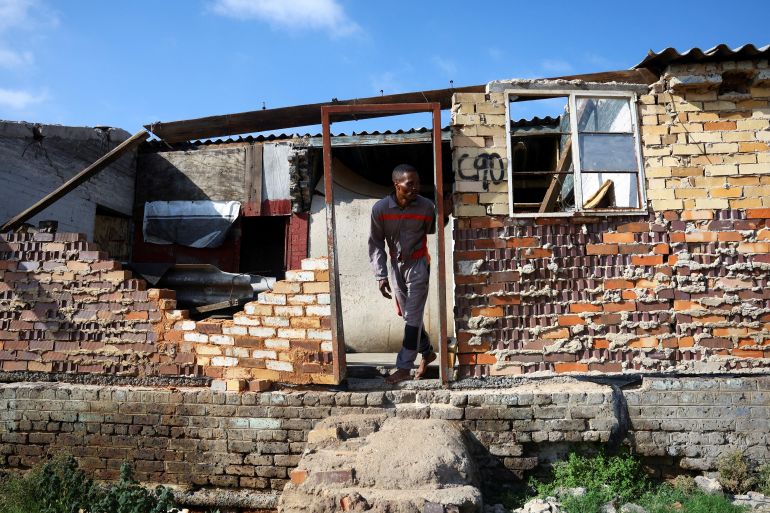
Johannesburg, South Africa – On a chilly afternoon in Soweto, Mlindelwa Mtungwa, 61, cooks in his tiny, dimly lit room at the Diepkloof hostel, using a small two-plate stove connected to an electricity source outside.
The father of six from Msinga village in KwaZulu-Natal (KZN) province moved to South Africa’s economic hub in 1979 in search of a better life, settling at the hostel some 14km (9 miles) south of the city centre. He has lived there ever since.
Keep reading
list of 4 itemsCan Jacob Zuma and his MK party unseat the ANC in South Africa’s election?
Jacob Zuma election ban: How does it affect South Africa’s election?
How a South African village turned an alien tree into superfood coffee
Gently turning pieces of chicken in a pot, he recalled with surprising fondness how orderly the strict, male-only dormitories were when they were run by the repressive apartheid government and how jobs were abundant, helping him pay rent and send money back home.
“Even though we were oppressed by the system, we had jobs. The hostel had electricity, flushing toilets and showers that had warm water,” he said, lamenting how many of those basics are unobtainable today.
Hostels were first introduced on the mines, and later townships like Soweto, as a place to house Black men from rural parts of the country who provided a cheap source of labour under apartheid.
But by 1994 – when white minority rule relinquished power and the country elected its first multiracial government – the nature of these spaces had begun to change.
South Africa was free and accessible to all. With that came a mass influx of people into cities and townships. However, despite the political gains, service delivery has not kept up with the needs of the population, state corruption and mismanagement thrive, and many promises remain unfulfilled.
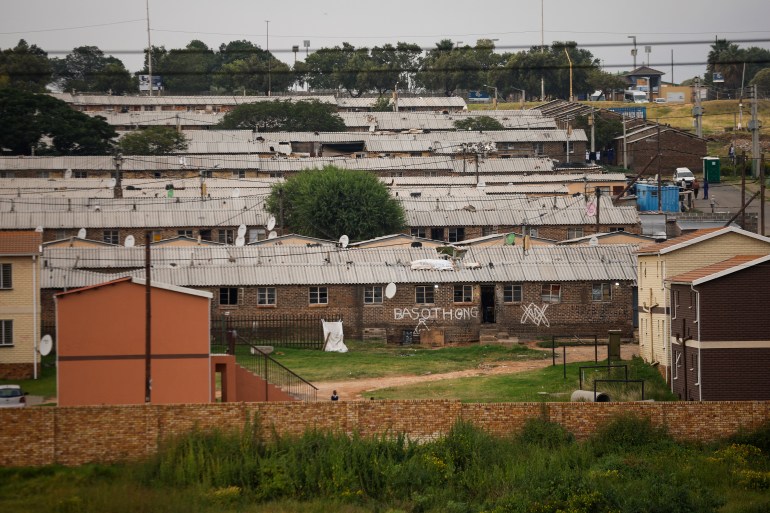
The Diepkloof hostel, like many others, has suffered neglect and deterioration. Today, the sprawling blocks, built in the 1970s, are dilapidated with broken windows and leaking roofs. Poverty, unemployment, crime, teen pregnancies, and alcohol and drug abuse are also rife.
‘As good as dead’
Last month, angered by the lack of basic services, hostel residents went out in protest – blocking major roads, including two highways, with burning tyres and rocks.
“The strike is about the rebuilding and fixing of the hostel houses that the premier of Gauteng [Panyaza Lesufi] has long promised to deliver on but failed,” said the hostel induna, or community leader, Sbongiseni Khoza.
“The truth is these hostel houses are as good as dead.”
Despite recent strides – including the provision of water from easily accessible nearby taps, an improvement on the far-flung communal taps used previously, and last year’s reinstallation of legal electricity connections – grievances about the living conditions persist.
“When we [community leaders] looked at the original toilet pipes underground, we found them to be in good condition but I don’t understand why they are not being fixed,” Khoza said, suspecting corruption is the reason those in charge have not improved sanitation and fixed the troubling bucket toilet system.
“The bucket toilets are bad and the smell is terrible,” said Thandeka Zondi, a resident of Diepkloof hostel, standing in the shared kitchen she uses. “It’s easy to be infected with transmittable diseases such as lice.”
The mother of five is gravely concerned about the unhygienic facilities that are shared with more than 30 people and emptied only twice a week and is pleading for flushing toilets so women and girls do not fall ill.
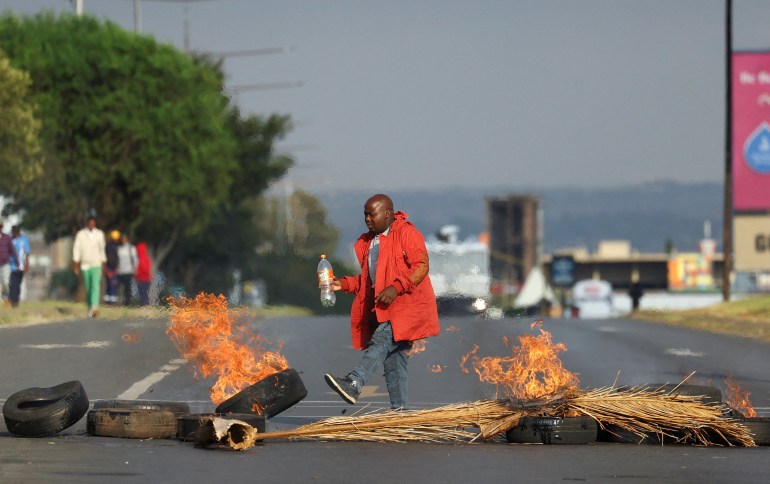
Khoza cautions that a lot could have been improved if the government was serious about service delivery in hostels but said there is no political will. This has left residents with no choice but to go to the streets to vent their frustrations, and they have decided to continue if their demands are not met.
Apartheid-era hostels
In Johannesburg, hostels are synonymous with the apartheid-era migrant labour system, which brought Black men from rural communities to work in the cities but refused to allow them to bring their families or ever build a real home.
In that way, hostels also fomented divisions within the townships – the designated Black residential areas that were located far from the areas white people inhabited.
As transit camps, hostels offered affordable accommodation for workers. But the male-only spaces were incongruous with the townships inhabited by families and existing communities – meaning hostel-dwellers were never properly integrated into township life.
In the 1980s and 90s, during the transition from apartheid to democracy, tensions between the two groups escalated violently.
The African National Congress (ANC) – the then-liberation movement that would become the governing party in 1994 – was trying to build support in KZN, where the opposition Inkatha Freedom Party (IFP) had its base. Violence erupted and soon spread to Johannesburg and surrounding areas, where hostel-dwellers – who were mainly migrants from KZN loyal to the IFP – squared off against ANC-supporting township residents.
The violence was part of a 10-year mini-civil war that left some 20,000 people dead.
More than three decades later, tensions remain, with many township residents still believing that the hostels on their doorsteps are dangerous and harbour criminals.
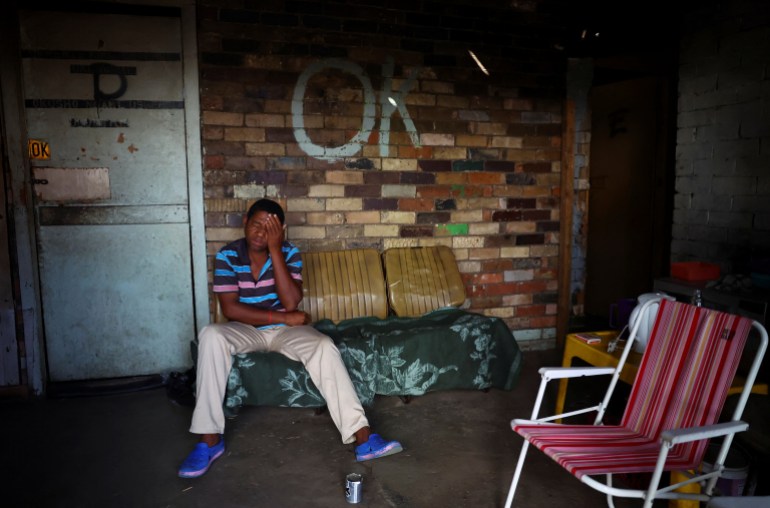
Overcrowding
Inside the formerly male-only Diepkloof hostel, each two-roomed dormitory with a small adjoining kitchen used to be shared by seven or eight people when Mtungwa first moved in. Now the rooms house full families.
This has led to overcrowding and further division of rooms to offer some sense of privacy.
In Mtungwa’s room, lined up clothes dangle high on the roof diffusing the light from coming in. A little grocery box, buckets of water, a plastic bathtub, blankets and a single mattress sitting on a block of bricks are the few items the bread delivery man has.
After apartheid ended, hostel-dwellers kept their allocated rooms within their families, so that even if a man left or passed away, his children or relatives would “inherit” his bed.
Mtungwa used to share his room with three other men but when they left without sending their children or relatives to claim their beds, he effectively became the sole owner.
At the same time, Mtungwa also applied for a free council house with the government’s Reconstruction and Development Programme (RDP).
But since 1996, his application has remained unanswered.
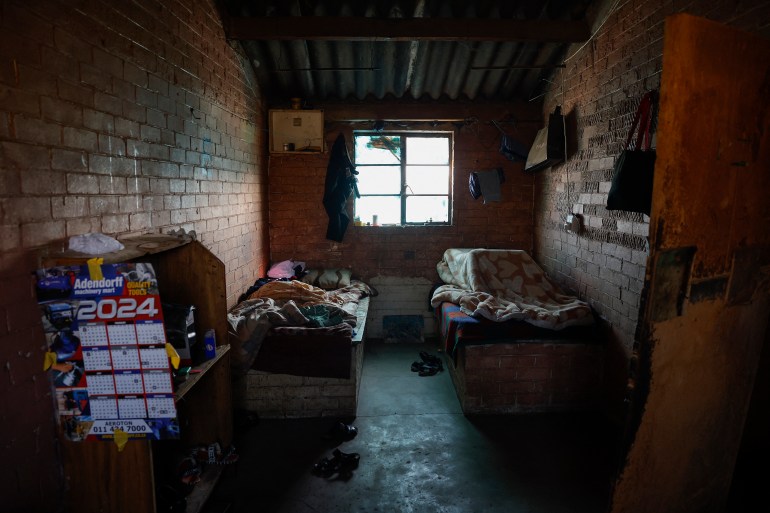
Empty promises
This year, South Africa marks 30 years since its first democratic elections, and voters will again go to the polls to elect a government. Due to poor service delivery, weak leadership and ongoing corruption, analysts say the ANC will struggle to win the kind of support it has enjoyed in the past.
In the Diepkloof hostel, residents are distrustful of the government. After the protests in March, Lebogang Isaac Maile, the head of the Department of Human Settlements for Gauteng province, to which Johannesburg belongs, arrived to speak to residents about their grievances.
But tensions rose when community leaders angrily demanded a timeline for when they would be given suitable housing, which led to Maile being whisked away by his security before he could address the crowd.
Two days later, Maile returned, this time accompanied by Johannesburg Mayor Kabelo Gwamanda from the Al Jama-ah party, an ally of the ANC. Gwamanda has a friendly relationship with the hostel leaders who credit him for helping reinstall water and electricity services last year after they had been cut off for over a decade.
Maile made more promises to fix the hostel and improve people’s living conditions, also assuring them that they would be first on the list to benefit from an upcoming new housing development project.
But many in the crowd were disappointed, feeling they had heard the same empty promises before.
After years of neglect, in 2008, the government began fixing some of the worst sections of the hostel. Authorities moved people from collapsing buildings to temporary shelters on the property, while they built RDP housing units for deserving families to move to.
But to the residents’ surprise, after the units were built, they were told that they would have to pay rent to live in them. So they rejected the offer and declared that nobody would reside there. The units stood empty for years, resulting in them being vandalised. However, in recent years, people alleged to be from the township have mysteriously moved in, residents say.
Meanwhile, authorities have continued moving the hostel-dwellers to inadequate temporary shelters.
In 2012, resident Thembi Mazibuko, 43, was moved to the shelters with other families before their hostel block was destroyed – joining others who had been there since 2008.
“We now share the shelter with rats,” said Mazibuko, who lives in a broken structure with her husband and five children. “They are eating our food, including the buckets we use.”
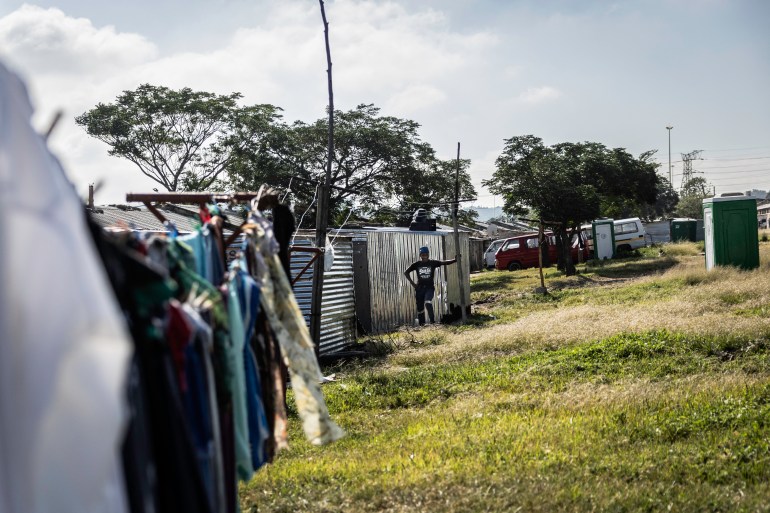
Urbanisation in Gauteng has put a strain on basic services, leading to the growth of informal settlements. Despite the government’s effort to deliver 10,000 housing units per year, the RDP housing backlog of people who have been on the waiting list since 1996 is more than one million.
This grim figure leaves people like Mtungwa who have been on waiting lists for decades feeling they have no chance of ever finding a home.
For years, he hoped to get a council house and bring his family from Msinga to stay with him in Johannesburg. But his children are now grown, with lives and jobs of their own.
Now, Mtungwa said, he will bear living in his tiny dimly lit room in the hostel until he retires from his job at the bread company where he has worked since 1982.
After that, he will move back to his village in KZN.
“I don’t think I will get a house,” he said, resigned. “Time has long passed.”